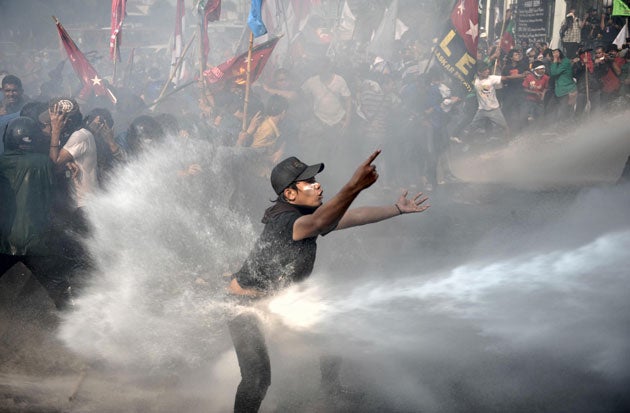Police want water cannons to beat back city rioters
Metropolitan and Greater Manchester forces are looking at continental-style crowd-control tactics in the wake of the G20 demonstrations

Your support helps us to tell the story
From reproductive rights to climate change to Big Tech, The Independent is on the ground when the story is developing. Whether it's investigating the financials of Elon Musk's pro-Trump PAC or producing our latest documentary, 'The A Word', which shines a light on the American women fighting for reproductive rights, we know how important it is to parse out the facts from the messaging.
At such a critical moment in US history, we need reporters on the ground. Your donation allows us to keep sending journalists to speak to both sides of the story.
The Independent is trusted by Americans across the entire political spectrum. And unlike many other quality news outlets, we choose not to lock Americans out of our reporting and analysis with paywalls. We believe quality journalism should be available to everyone, paid for by those who can afford it.
Your support makes all the difference.British mainland police want water cannons to use against demonstrators in the face of criticism that conventional crowd-control tactics, such as those used during the G20 demonstrations, are failing to prevent violence.
The Metropolitan and Greater Manchester forces are set to request permission to use cannons, according to internal documents seen by The Independent on Sunday.
MPs on the Home Affairs Committee last week condemned the Metropolitan Police's handling of the G20 protests in London in April, particularly the behaviour of untrained officers when confronted with large crowds and the controversial technique of "kettling" – the compulsory containment of demonstrators.
The Metropolitan Police Commissioner, Sir Paul Stephenson, admitted Scotland Yard was looking at more robust tactics – including water cannons – in the wake of the G20 disturbances. But the IoS has learnt that Scotland Yard first began training officers to use the weapons in May 2008, a year before G20. The same month senior Met officers considered a plan to buy six water cannons for "quelling or moderating violent disorder" at a cost of £5m. They are seeking financial help from the Home Office.
Greater Manchester Police (GMP) has spent two years investigating the use of water cannons. A GMP source said damage caused by rampaging Rangers fans during the Uefa Cup final last summer had given the issue urgency.
Only the Northern Ireland Police Service has used water cannon in the UK, but they are more commonly used in continental Europe. In the US they are no longer widely used because of their association with the brutal repression of the civil rights movement.
Politicians from both cities were last night dismayed at the prospect of continental-style riot-control operations on British streets. Tony Lloyd, MP for Central Manchester, said he hoped he would never see the day when they were used, but added: "Is it the worst thing the police could do? I genuinely think the answer is no. You would sooner have water cannons used rather than plastic bullets or other techniques available to them deployed on the streets of my city."
However, Jenny Jones, a Green Party member of the London Assembly who sits on the Metropolitan Police Authority, said: "There are other, more peaceful ways, to restrain the rare violent protest in London. The police currently seem to confuse the word 'protester' with the word 'criminal' and go to police public order events in the wrong frame of mind – aggressive and confrontational."
At least two Met officers have already been trained to use cannon, while in March the GMP agreed 12 senior officers would train in Northern Ireland. The GMP is now considering whether to buy two vehicles for £1.2m or hire ones from the six-strong Northern Irish fleet.
Home Office experts said the vehicles, produced by the Belgian firm Somati, are suitable for use in the UK. Guidelines drawn up by the Association of Chief Police Officers state water cannons "provide a graduated and flexible application of force" to deter people from staying in an area, or "physical water jets that can physically push people to disperse them".
Internal GMP documents reveal the force is anxious to avoid giving the impression of "being heavy-handed".
Chief Superintendent Phil Hollowood, head of the GMP's Specialist Operations Branch, said: "When disorder occurs, it is our job to protect people, property and police officers and we have a responsibility to sensibly and carefully consider all the options available to us to best do that.
"We have had early dialogue with our colleagues in the PSNI to look at the feasibility [of water cannon], but it is at a very early stage of discussions and no decisions are going to be taken any time soon."
Join our commenting forum
Join thought-provoking conversations, follow other Independent readers and see their replies
Comments